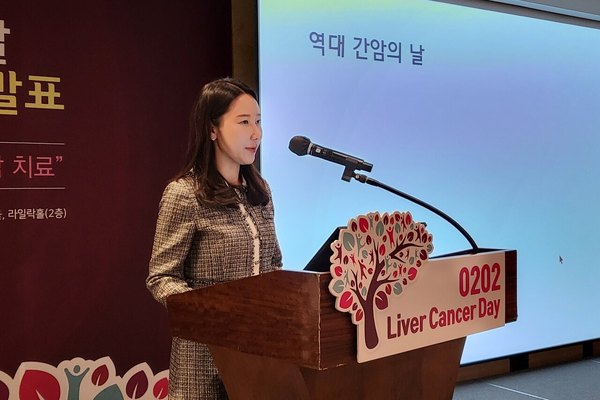“Elderly liver cancer patients also show similar treatment effects and side effect rates to younger patients. So, aged liver cancer patients need to try to improve prognosis through active treatment.”

Lee Han-ah of the Department of Gastroenterology at Ewha Womans University Mokdong Hospital said so at a ceremony celebrating the seventh Liver Cancer Day at Westin Chosun Hotel in downtown Seoul on Thursday.
Noting that elderly liver cancer patients continue to increase and treatments keep progressing in keeping with the trend, Professor Lee cited carotid radiography and immunotherapy as such examples.
Carotid radiography is a method of radiation therapy in the body that injects microspheres containing radioisotopes into the hepatic artery. It causes less pain or fever than carotid chemotherapy, ensuring higher quality of life after treatment while safely performed in elderly patients and those with large tumors.
Professor Lee explained that current immunotherapies used as primary treatments, such as Tecentriq (atezolizumab) and Avastin (bevacizumab), also can be used for elderly patients, as they cause fewer cases of suspension but show more excellent anticancer effects than existing molecular targeted agents.
However, she added that caution is needed in patients with autoimmune diseases, and in those who have undergone organ transplants or tend to bleed.
According to the data of the random liver cancer registration by the Korean Liver Cancer Association, of the 15,186 newly diagnosed patients with liver cancer from 2008 to 2017, 38.4 percent were aged 65 and older, with the share continuing to increase from 35.5 percent in 2008 to 45.9 percent in 2017.
“Elderly liver cancer patients often do not receive treatment after diagnosis of liver cancer compared to younger patients,” Professor Lee said. “Active liver cancer treatment helps improve survival rates regardless of age. Therefore, it is not appropriate to give up treatment just because you are old."
In reality, 16.9 percent of under-65 liver cancer patients do not receive treatment after diagnosis, but 25.5 percent of patients 65 and older do so. In the case of progressive liver cancer accompanied by vascular invasion or extrahepatic metastasis, 40.2 percent of elderly patients were not treated.
“There were no differences in treatment effects based on various data, such as cancer stage, carotid radiography, and progress of immunotherapy of atezolizumab and bevacizumab,” Lee said. “There may be concerns about the side effects of treatment due to old age, but this can also be solved through proper treatment.”
According to the analysis of liver cancer registration data, elderly liver cancer patients had significantly more comorbidities than younger patients. Some 34.8 of elderly patients also had diabetes, 52.4 percent had hypertension, and their kidney and liver functions were also found to have declined.
Besides, the share of hepatitis B-related liver cancer among elderly patients was lower, with 29.7 percent compared with 68.1 percent among younger patients. However, the comparable share of hepatitis C-related liver cancer was higher, with 18.1 percent vs. 6.1 percent, and the share of liver cancer caused by alcoholic liver diseases was also higher among elderly patients than younger patients, with 28.0 percent vs. 10.0 percent.

